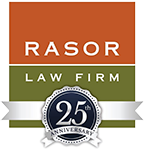Sex Offender Lawyers in Michigan
Sex Offender Registration In Michigan
Individuals who are convicted of certain sex crimes in Michigan are required to register their personal information with a statewide sex offender database known as the Michigan Sex Offender Registry (MSOR). This registry allows law enforcement agencies and certain members of the public the ability to identify people living near them with histories of sexually abusive behavior. Sex offender registration can be devastating to a person’s livelihood, as it requires them to live their life under intense scrutiny and places severe limitations on where they can legally live and work. If you have been accused of a sex crime and are facing registration, the award-winning Royal Oak criminal defense attorneys at Rasor Law Firm can provide the powerhouse defense you need to maximize your chances of securing a favorable outcome for your situation.
Why choose our world-class attorneys to defend your case?
More than 25 years of proven experience
Super Lawyers® Rising Stars℠ inclusion
Top Lawyers by DBusiness
Fighting for the accused since 1994
What Does Sex Offender Registration Involve?
Registration as a sex offender requires an individual to provide their name, address, aliases, employment information, photographs, license plate number, vehicle description, and other pertinent information to law enforcement for the purposes of being included on a database. This database can be accessed either by law enforcement only or by members of the public depending on a person’s criminal history. The length of time that a person is required to register will vary depending on the offense.
Sex offenses are divided by different “tiers,” which are as follows:
Tier I: Convictions of low-level sex offenses such as possession of child pornography, aggravated indecent exposure against a victim under age 18, and fourth degree criminal sexual conduct against a victim age 17 or older are considered Tier I offenses. Individuals convicted of Tier I offenses must register with a non-public sex offender registry for 15 years.
Tier II: More serious sex offenses such as distributing child pornography, pandering, or gross indecency against a victim between the ages of 13 and 17 are classified as Tier II offenses. A conviction of a Tier II offense carries mandatory public sex offender registration for a period of 25 years. Tier II offenders must check in with law enforcement and verify their information twice per year.
Tier III: The most serious sex crimes are considered Tier III offenses, resulting in lifetime public registration and mandatory check-ins on a quarterly basis. Tier III offenses include kidnapping a minor under 18, first degree criminal sexual conduct, assault with intent to commit criminal sexual conduct involving penetration, and gross indecency against a victim less than 13 years of age.
Willfully failing to register as a sex offender or check in with law enforcement is charged as a felony, carrying up to four years in prison and up to $2,000 in fines for a first offense. Non-willful failure is a misdemeanor, as is failing to pay the sex offender registration fee.
How Can Sex Offender Registration Affect My Life?
Having your criminal record become public information can not only be embarrassing, but it can also forever tarnish your reputation and destroy your personal relationships. Sex offender registration can make it extremely difficult for you to reintegrate with society even long after you have already served your sentence, as the associated employment and housing restrictions can sometimes prohibit a person from living or working in entire cities. It is also not uncommon for sex offenders to be harassed, ostracized, or even attacked by members of the community due to their status.
We Fight To Win – Contact Us Today
Featured In













833-JIM-WINS
Handcrafted Legal Strategy. Personal Attention. Maximum Results.
